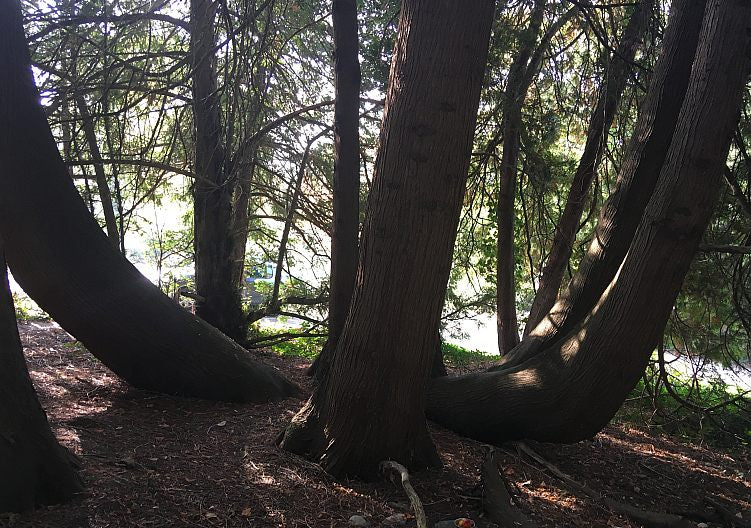Your shopping cart is currently empty.
| Subtotal | €0,00 |
| Shipping Rate | including VAT, excl. Shipping Rate |
| Total | €0,00 |
|---|
21.12.2023
Read article
What would we humans be without trees? We probably wouldn’t be here in the first place. Trees offered and offer us ideal habitats. And they provide us with food and wood.
Trees have had and still have an influence on how we as human beings in the world. Trees play a prominent role in many mythologies. For many cultures, trees were and are sacred.
Alexander von Humboldt is said to have said: “Be in awe of the tree. It is one great miracle and it was sacred to your ancestors. The enmity against the tree is a sign of lower sentiments. "
Sacred trees in Europe
In our European history, trees seem to have played an important role, especially in the Germanic and Celtic communities.
The world tree Yggdrasil was venerated by the Teutons. 12th century Icelandic poet Snorri Strulson describes how this tree pervades the universe like a living pillar. Yggdrasil connects Asgard (world of gods and great halls), Midgard (world of people) and Helheim (world of the dead) with one another. A tree as the axis of the world. And as a connection to other worlds.
The Germanic god father Wotan received the fence on this world treeberkraft of runes after hanging upside down on a branch for nine days.
And: Wotan carved the first people out of the wood of trees. The first woman out of an elm, the first man out of an ash tree.
The Roman chronicler Tacitus wrote that the forests were sacred to Teutons.
It is also known that the Germanic peoples who lived in what is now Fritzlar (Hessen) after the migration of peoples had a consecrated or sacred tree: the Danube oak. The Christian missionary Bonifatius had this tree felled as a result of Christianization - and built a chapel out of it.
In the Jewish and Christian tradition, on the other hand, trees do not seem to be of great importance. With the fall of man, an apple tree marks the beginning of a painful story: Eve and Adam ate the fruit of an apple tree and were thus sent out of paradise.
Sacred trees in Asia
In Hinduism, the Asvattha is considered a sacred fig tree and a symbol of creation.

The Bodhi tree has a special meaning in Buddhism. The Buddha is said to have experienced enlightenment under this tree. It is narrated that after enlightenment, the Buddha continued to give his discourses and teachings under trees - in parks and forests.
Trees as brothers and sisters
How can one explain this accumulation of mythological symbolization and stories in relation to trees?
Maybe because trees are so similar to us?
The forestry scientist Andreas Roloff writes in his Bookthat trees were like brothers and sisters to people. And the most fitting image to symbolize humanity: We too stand upright on this earth and stretch our arms to heaven.
At the same time, trees make us aware of how modest a person's life span is. Trees can connect us with time and the horizon. Trees give us a sense of timelessness and connect us to the past. The tree in the change of the seasons symbolizes our own life story of becoming and passing.

Trees as a symbol of life
Trees seem to embody a spiritual longing: a life in harmony with heaven and earth. Trees, like Yggdrasil, connect heaven and earth.
Susanne Fischer-Rizzi also writes about this in her book Trees of hope:
«The tree of life is the ancient and universal symbol for integration and growth, for life itself. This is also hidden behind the veneration of trees. The image of the Tree of Life appeared in this temple like an archetype of our soul, an archetype, a universal image that is inscribed in our soul and accessible to all people. A revitalization of our old connection to trees can send an effective symbol hidden in our soul like a ray of light and reconnect us with the tree of life and the primal force of life."
Trees increase our well-being
Trees create an atmosphere of calm and peace, which for many people is relaxing and improves their mood. Maybe that's one of the triggers for that health effects of trees on us humans.
Trees can connect us: with the forces of nature, with time, with life. And with our history as people.
Or as Hermann Hesse wrote:
“Trees are sanctuaries. Whoever speaks to them, whoever knows how to listen to them, will learn the truth. "
Andrew Hunkeler
Dipl. Social and cultural anthropologist with a focus on sustainable and participatory green space design in cities. (More about the author).
My vision is to bring together: people and trees, nature and culture, population and urban authorities.
If you have any questions, suggestions, interesting stories or exciting knowledge on this topic, please write to me: andreas@baumbad.de. I'm looking forward to your message!
Do you want more tree knowledge?
That might interest you
Great idea, easy handling and everything from ordering to delivery.
Michael K.
















